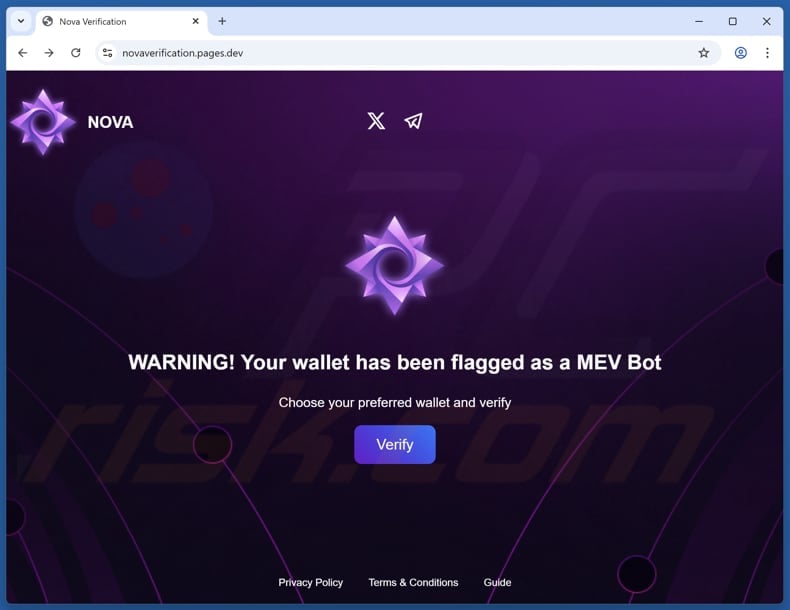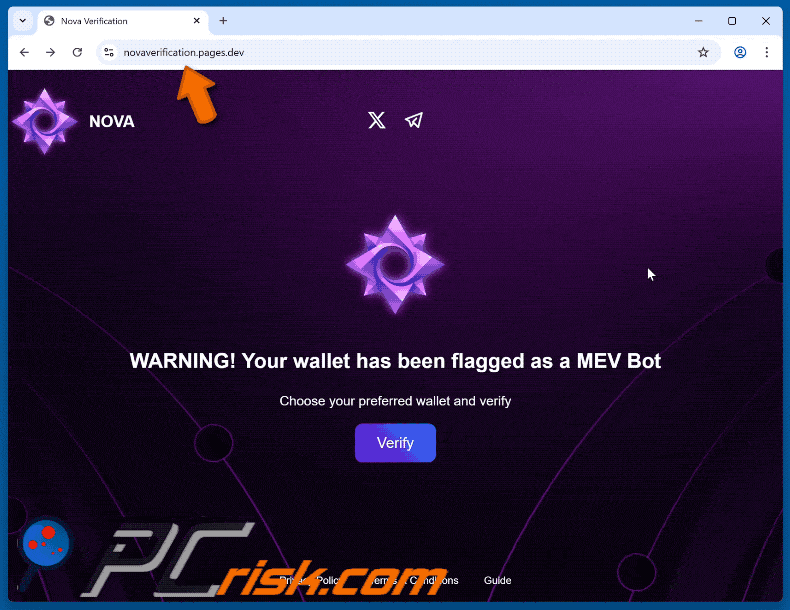How to spot scams like "Your Wallet Has Been Flagged As A MEV Bot"
Phishing/ScamAlso Known As: Your Wallet Has Been Flagged As A MEV Bot fake notification
Get free scan and check if your device is infected.
Remove it nowTo use full-featured product, you have to purchase a license for Combo Cleaner. Seven days free trial available. Combo Cleaner is owned and operated by RCS LT, the parent company of PCRisk.com.
What kind of scam is "Your Wallet Has Been Flagged As A MEV Bot"?
We have inspected the website (novaverification.pages[.]dev) and found that it is used by scammers who aim to steal personal information from unsuspecting users. The site displays a deceptive message to extract personal details. Victims of this scam can suffer monetary loss. Thus, if encountered, this website should be closed.

"Your Wallet Has Been Flagged As A MEV Bot" scam in detail
This fake website is designed to trick visitors into believing their wallet has been flagged as an MEV bot. MEV stands for Maximal Extractable Value, a hidden cost that can affect users when making transactions on the Ethereum blockchain.
Whenever someone performs an action in decentralized finance (DeFi)—such as trading tokens, purchasing NFTs, or contributing to a liquidity pool—there are individuals known as "searchers" who monitor pending transactions. These searchers use automated programs called MEV bots to manipulate the order or conditions of transactions to generate profit for themselves.
The deceptive site instructs visitors to "choose their preferred wallet and verify". Ultimately, users are requested to enter their private key to verify that their wallet is not an MEV bot. The entered information is sent to scammers who can use it to access cryptocurrency wallets. With this access, fraudsters can steal cryptocurrency.
Scammers can quickly transfer all available assets out of the wallet. Since crypto transactions are irreversible, victims cannot recover the stolen funds. It is important to be careful when entering information on suspicious pages or taking other actions to avoid monetary loss, identity theft, or other issues.
| Name | Your Wallet Has Been Flagged As A MEV Bot fake notification |
| Threat Type | Phishing, Scam, Social Engineering, Fraud |
| Fake Claim | User's wallet has been flagged as an MEV bot |
| Disguise | Legitimate warning from NOVA |
| Related Domain | novaverification.pages[.]dev |
| Detection Names | Trustwave (Phishing), Ermes (Not Recommended), Full List Of Detections (VirusTotal) |
| Symptoms | Unofficial domain, lack of official verification, unexpected or irrelevant warning. |
| Distribution methods | Compromised/hijacked websites, stolen or fake social media profiles, rogue online pop-up ads, unwanted applications. |
| Possible Damage | Loss of sensitive private information, monetary loss, identity theft |
| Malware Removal (Windows) |
To eliminate possible malware infections, scan your computer with legitimate antivirus software. Our security researchers recommend using Combo Cleaner. Download Combo CleanerTo use full-featured product, you have to purchase a license for Combo Cleaner. 7 days free trial available. Combo Cleaner is owned and operated by RCS LT, the parent company of PCRisk.com. |
Conclusion
In conclusion, this fake website is designed to steal users' cryptocurrency by exploiting fear. By convincing users to enter their private keys, scammers gain full control of their wallets and drain funds. This highlights the importance of staying vigilant and never sharing sensitive wallet information on unofficial or suspicious platforms.
Some examples of crypto-related scams are "Claim BasedAI Scam", "Raydium Airdrop", and "Fake DeXe Protocol Website".
How did I open a scam website?
Scammers often promote scam websites by hijacking or faking popular accounts on social media platforms like X and Facebook. Compromised websites, including hijacked WordPress sites, are also used to spread scam content.
Furthermore, scammers promote their scams through phishing emails, misleading ads, deceptive pop-ups, and push notifications. Users who visit torrent or illegal streaming sites (and similar platforms) can also be exposed to scams, as these pages commonly use rogue ad networks that redirect visitors to scam pages.
How to avoid visiting scam pages?
Be wary of unexpected or unrelated emails, especially those from unknown or suspicious senders. Avoid clicking on any links or opening attachments they contain. Steer clear of pop-ups, ads, and links on unreliable websites, and deny notification requests from questionable pages.
Always download software from official sources or trusted app stores, and keep your operating system and applications up to date. Regularly scan your device with trusted antivirus software. If your computer is already infected with unwanted apps, we recommend running a scan with Combo Cleaner Antivirus for Windows to automatically eliminate them.
The appearance of "Your Wallet Has Been Flagged As A MEV Bot" scam (GIF):

Instant automatic malware removal:
Manual threat removal might be a lengthy and complicated process that requires advanced IT skills. Combo Cleaner is a professional automatic malware removal tool that is recommended to get rid of malware. Download it by clicking the button below:
DOWNLOAD Combo CleanerBy downloading any software listed on this website you agree to our Privacy Policy and Terms of Use. To use full-featured product, you have to purchase a license for Combo Cleaner. 7 days free trial available. Combo Cleaner is owned and operated by RCS LT, the parent company of PCRisk.com.
Quick menu:
- What is Your Wallet Has Been Flagged As A MEV Bot fake notification?
- How to identify a pop-up scam?
- How do pop-up scams work?
- How to remove fake pop-ups?
- How to prevent fake pop-ups?
- What to do if you fell for a pop-up scam?
How to identify a pop-up scam?
Pop-up windows with various fake messages are a common type of lures cybercriminals use. They collect sensitive personal data, trick Internet users into calling fake tech support numbers, subscribe to useless online services, invest in shady cryptocurrency schemes, etc.
While in the majority of cases these pop-ups don't infect users' devices with malware, they can cause direct monetary loss or could result in identity theft.
Cybercriminals strive to create their rogue pop-up windows to look trustworthy, however, scams typically have the following characteristics:
- Spelling mistakes and non-professional images - Closely inspect the information displayed in a pop-up. Spelling mistakes and unprofessional images could be a sign of a scam.
- Sense of urgency - Countdown timer with a couple of minutes on it, asking you to enter your personal information or subscribe to some online service.
- Statements that you won something - If you haven't participated in a lottery, online competition, etc., and you see a pop-up window stating that you won.
- Computer or mobile device scan - A pop-up window that scans your device and informs of detected issues - is undoubtedly a scam; webpages cannot perform such actions.
- Exclusivity - Pop-up windows stating that only you are given secret access to a financial scheme that can quickly make you rich.
Example of a pop-up scam:

How do pop-up scams work?
Cybercriminals and deceptive marketers usually use various advertising networks, search engine poisoning techniques, and shady websites to generate traffic to their pop-ups. Users land on their online lures after clicking on fake download buttons, using a torrent website, or simply clicking on an Internet search engine result.
Based on users' location and device information, they are presented with a scam pop-up. Lures presented in such pop-ups range from get-rich-quick schemes to fake virus scans.
How to remove fake pop-ups?
In most cases, pop-up scams do not infect users' devices with malware. If you encountered a scam pop-up, simply closing it should be enough. In some cases scam, pop-ups may be hard to close; in such cases - close your Internet browser and restart it.
In extremely rare cases, you might need to reset your Internet browser. For this, use our instructions explaining how to reset Internet browser settings.
How to prevent fake pop-ups?
To prevent seeing pop-up scams, you should visit only reputable websites. Torrent, Crack, free online movie streaming, YouTube video download, and other websites of similar reputation commonly redirect Internet users to pop-up scams.
To minimize the risk of encountering pop-up scams, you should keep your Internet browsers up-to-date and use reputable anti-malware application. For this purpose, we recommend Combo Cleaner Antivirus for Windows.
What to do if you fell for a pop-up scam?
This depends on the type of scam that you fell for. Most commonly, pop-up scams try to trick users into sending money, giving away personal information, or giving access to one's device.
- If you sent money to scammers: You should contact your financial institution and explain that you were scammed. If informed promptly, there's a chance to get your money back.
- If you gave away your personal information: You should change your passwords and enable two-factor authentication in all online services that you use. Visit Federal Trade Commission to report identity theft and get personalized recovery steps.
- If you let scammers connect to your device: You should scan your computer with reputable anti-malware (we recommend Combo Cleaner Antivirus for Windows) - cyber criminals could have planted trojans, keyloggers, and other malware, don't use your computer until removing possible threats.
- Help other Internet users: report Internet scams to Federal Trade Commission.
Frequently Asked Questions (FAQ)
What is a scam website?
Scam sites are fraudulent websites that often mimic the design of legitimate platforms to trick users into taking certain actions.
What is the purpose of an online scam?
These pages are commonly created to steal cryptocurrency, collect sensitive information such as credit card details or login credentials, distribute malware, trick users into making payments for fake products or services, or manipulate them into performing other steps.
Why do I encounter scam websites?
Scam websites are encountered when users click on deceptive links, ads, or pop-ups, or visit sites linked to malicious advertising networks. They can also be promoted through fraudulent emails, links shared by fake accounts on social media platforms, and similar channels.
Will Combo Cleaner protect me from scams?
Combo Cleaner scans all websites users visit, identifying malicious sites (including pages hosting scams). It notifies users of potential threats and blocks access to untrustworthy pages.
Share:

Tomas Meskauskas
Expert security researcher, professional malware analyst
I am passionate about computer security and technology. I have an experience of over 10 years working in various companies related to computer technical issue solving and Internet security. I have been working as an author and editor for pcrisk.com since 2010. Follow me on Twitter and LinkedIn to stay informed about the latest online security threats.
PCrisk security portal is brought by a company RCS LT.
Joined forces of security researchers help educate computer users about the latest online security threats. More information about the company RCS LT.
Our malware removal guides are free. However, if you want to support us you can send us a donation.
DonatePCrisk security portal is brought by a company RCS LT.
Joined forces of security researchers help educate computer users about the latest online security threats. More information about the company RCS LT.
Our malware removal guides are free. However, if you want to support us you can send us a donation.
Donate
▼ Show Discussion